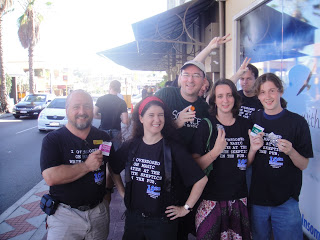Michael Shermer gave an engaging lecture Wednesday night at UWA’s Octagon Theatre. Since it was Science Week, he spoke on the scientific method, and the need for skepticism in evaluating ideas.
And I got to ask him a question. I mentioned in this post that I think he’s backed the wrong horse on the science v. religion question. In ‘Why Darwin Matters’, he seemed to lean toward the ‘Non-Overlapping Magesteria Argument’ — that science is science and spirituality is spirituality, and science can’t examine spirituality. Besides the gaping holes in the argument, it’s just an unscientific view. How can you falsify it?
But I didn’t want to fight over that — I’m sure he knows the terrain. No, I was more curious about the strategy of it all. Here was my question:
Me: I’ve enjoyed reading “Why Darwin Matters.” You give three possibilities for the relationship between science and religion. One is the Conflicting Worlds model, the Same Worlds model, and the Shared Worlds. You seem to reject the idea that science is right and religion is wrong, as an extremist position. Instead you seem to say that God is somehow outside of science.
I was wondering if that’s really your view, (audience laughter) or is this some kind of tactic that we use to lull the religious to sleep so that the grown-ups can do their work?
Shermer: A sop (unintelligible), yes. No, I do think it’s important to strategise how to interact with other people. And if you tell somebody that their most cherished beliefs are bullshit, (bright tone) and now let’s go to the ball game and have fun together! (audience laughter) You know, that isn’t probably the best way to win friends and influence people. It’s always good to try to be polite and respectful and whatever — you’re more likely to change their minds. That’s isn’t necessarily why I do it; that’s the way I am.
But the argument I make is that — that’s why I went through that whole business of aliens and Shermer’s Last Law and all that stuff. You can’t possibly find a god. Most people think of god as this supernatural being, that isn’t just some garage tinkerer, that isn’t just a genetic engineer who’s really good at it. That somehow that isn’t going to fulfill what people think when they think about god. So I really don’t… I can’t possibly imagine any experiment that any scientist could ever run and go, “Oh, look! There is a god! Wow!” Or “Nope! There isn’t, ’cause look. Failed the experiment.” Something like that. I just don’t think you could do that.
Now Dawkins makes an interesting argument in ‘The God Delusion’ about probabilities, that, you know, on a range… a scale of one to seven, what’s the likelihood? No, we can’t say for sure that there isn’t a god, but there probably isn’t. That’s a reasonable argument. But there you’re not using science directly to test the godly probabilities. It’s something slightly different than that.
Did he answer my question?
In a way, kind of. I was left with the feeling like he’s just being nice and giving religious folk on the edges a way to accept Darwin and science. Off the point, he argues that you can’t falsify the supernatural, to which I readily agree.
But this touches on what should be a major issue among atheists: How do you change people’s minds? Shermer’s right: confronting people directly about their beliefs won’t change their minds. You know what else doesn’t change people’s minds? Not confronting them directly about their beliefs. Thinking back to my days as a believer, if you’d said that I could keep my beliefs, that they were perfectly good, but that science is good too, I’ll guarantee you I’d have left the discussion thinking exactly what I was thinking before.
So what does change people’s minds? Well, in many cases, nothing. If people really want to believe in ghosts or UFO’s or Reiki, no evidence will shift ’em. But there are a certain number of smart people who are in a belief system, and eventually they’ll notice the contradictions and feel enough cognitive dissonance to reach escape velocity. For these people, we need to foster a climate where science and evidence are regarded as authoritative and where disbelief is supported (intellectually and socially), until they’re ready to make the jump. Shermer’s certainly doing his part in this by giving lectures about science and scepticism, with intelligence and good humour. I’m doing my part in this by pointing out firmly (and repeatedly) that no evidence exists for the supernatural, and inviting people to show me some. I don’t sugar-coat my point of view, but I don’t think that’ll turn anyone off; the deeply committed won’t listen anyway. And I think it’s important to be direct with people.
Education is one way of promoting good views. Ridicule is one way of discouraging bad views. I do both. If you can’t manage it, you’re only using half the tools at your disposal. But do what you’re comfortable with. I’ll be over here holding the Overton Window on my end. Go ahead and slag me off and call me a militant atheist and an extremist, so you can look moderate by comparison. That’s absolutely part of the strategy. I don’t mind; I’ll take it for the team.
Just please remember that the forces of anti-science are not content to just believe what they believe. They want to influence what everyone believes. Religions constantly expend a great deal of energy in proselyting. They send missionaries around the world, they build publishing factories, and they go about promoting their memes in an organised way. So let’s not kid ourselves that they just want to play softball.


Recent Comments